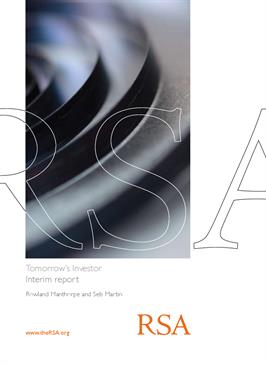Through their pensions and life insurance policies, ordinary investors own large chunks of the UK stock market. Yet, at present, few of them are involved in the management of their investments.This report summarizes the the first stage of this project, where a forum of 25 ordinary investors explore what greater engagement might mean and what the benefits might be.
For ordinary citizens, there are pressing contingent reasons that make the case for increased involvement: a looming pensions shortfall; the shift from direct benefit to direct contribution, which leaves citizens unwittingly speculating on the stock market; and irrefutable evidence of mismanagement. The 2008 crash in financial markets suggests that issues of ownership and control are critical. Would a crisis have been averted by greater citizen engagement?
Awareness and understanding of finance varies considerably. However, today’s investors are almost universally detached from their pensions. This leads to what we call “the paradox of control”. Pensions are almost universally regarded as the most important financial holding an individual owns, yet conversely are the financial holding consumers feel the most detached from.
Investor disengagement is driving distrust in the market. Consumers see pension shortfalls and are worried about their financial future, but don’t feel they have any choices or opportunities to give their investment the best possible chance of delivering what they want at retirement.
The greatest concern relating to the pension market is return and security at retirement. Social and ethical issues are starting to become issues for some investors, but for the majority they are secondary concerns.
Changing the current disconnect will be difficult. The deliberative forum highlighted the difficulty of communicating these issues to investors. Overloading them with facts and information, or presenting issues in abstract, intangible terms, does little to aid understanding or move people to action.
However, the experience in other arenas, most notably direct shareholding, suggests that if investors are given simple and easy to make choices regarding their investments, and they can see clear and tangible benefits to those choices, then they can and will exercise choice and enforce change in the markets.
-
The investments market and the pensions market in particular are not easy waters to navigate for most consumers.
-
Typically investors do not want to get heavily involved in the day-to-day running of their investments and do not generally feel qualified to do so.
-
At the same time there is an underlying sense that they are being excluded by the very nature and structure of the markets.
-
If they can be presented with simple and easy to make choices regarding their investments and they can see clear and tangible benefits to those choices then they can exercise choice and enforce change in the markets.
pdf 214.1 KB
Contributors


Related reports
-
Tomorrow's Investor report
Investor disengagement exacerbated the recent financial crisis. How can ordinary savers connect better with the company they have invested in through their pensions or savings?


Be the first to write a comment
Comments
Please login to post a comment or reply
Don't have an account? Click here to register.